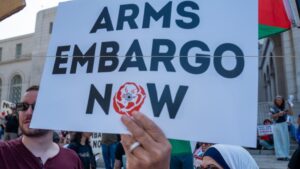As Israel launches its largest military assault in the West Bank in twenty years, I cannot stop thinking about the people I met in the occupied territory. I think of the mother in Jenin who was on the phone with her two sons seconds before their house was burned in an Israeli raid. I think of the wife of a man who was being held in an Israeli prison without charge or trial asking me, “Is there anything you can do? My husband is dying.” I think of the farmer who gifted me a melon even though he could barely put food on his own table and I was there only for a short period of time, traveling and volunteering with Faz3a, an international protective presence organization.
While all eyes have been on Gaza, Palestinians in the West Bank are undergoing what many call a “slow genocide”. Every day, Israeli settlers attack Palestinian families to push them off their private land. They destroy water wells, burn houses, and assault families. Palestinians who remain on their land risk arrest. In the last 10 months, 9,000 Palestinians from the West Bank have been arrested and detained without charge or trial, many experiencing torture.
In July, the International Court of Justice (ICJ), the highest global court, ruled that Israel’s occupation of the West Bank, East Jerusalem, and Gaza was illegal. The Court held that the regime of segregation that the Palestinian people live under—complete with separate roads, rationed access to water, and a separate legal system based on military law—amounts to apartheid. The Court ordered Israel to withdraw its settlers from the occupied Palestinian territory, pay reparations, and respect the Palestinian right to self-determination.
A day later, American friends of mine were violently attacked by settlers in the West Bank. They were accompanying Palestinian farmers to their olive groves when settlers from the nearby Esh Kodesh settlement descended and beat them with metal pipes. This month, another unarmed American volunteer with the international protective presence organization Faz3a was shot in the leg by the Israeli army. The U.S. State Department has remained largely silent.
As the Democratic Party vies for votes, many have demanded the U.S. impose an arms embargo on Israel as a way to signal to Prime Minister Netanyahu that he cannot continue to violate international law with impunity. What few people know is that an arms embargo is not only what 60% of Americans and nearly 80% of Democratic voters want — it is, in fact, already required by law.
U.S. federal law is clear—countries that receive U.S. military funding must meet human rights standards or risk losing their funding.

